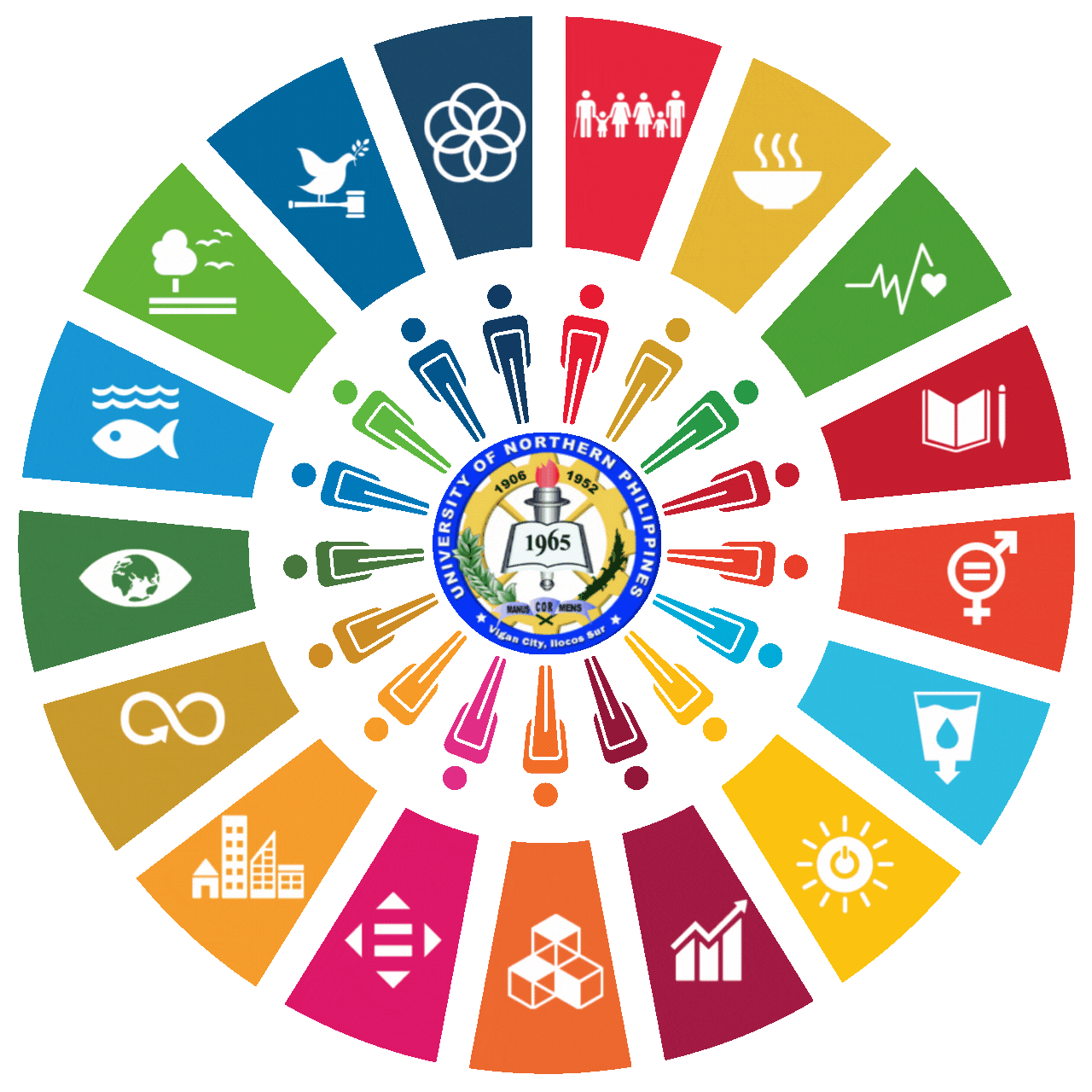

SDG 8 - DECENT WORK NAD ECONOMIC GROWTH
The University of Northern Philippines (UNP) demonstrates a strong commitment to Sustainable Development Goal 8: Decent Work, and Economic Growth through its comprehensive approach to education, skills development, and community engagement.
Proponents: Romelia P. Tamayo, Erwin A. Tamayo, Lorena T. Darisan, Fe R. Rodillas, Ivy Charmaine A. Cabangbang and Irene Melanie G. Gerona
Abstract: Introduction: Overseas Filipino Worker (OFW) nurses contributed substantially to the healthcare systems of the nations where they were employed during the COVID-19 pandemic. Although studies about nurses' experiences during the COVID-19 pandemic have been conducted, there is still a gap in knowledge on the experiences of OFW nurses outside the country. Limited studies focus on the effects of the pandemic on nurses' overall risks and wellbeing. Objectives: This study aimed to explore the lived experiences of the OFW nurses who handled COVID-19 patients confined in hospitals. Methods: Hermeneutic phenomenology was employed in the study. A purposeful sampling technique was used to choose the participants. The study was conducted from August 2022 to December 2022. The participants of the study were the seven OFW nurses working in hospital ICUs and COVID wards. The data were analyzed using the Van Manen Method. Results: Eight main themes and twenty-four subthemes emerged from their lived experiences. OFW nurses demonstrated teamwork, spiritual ties, compassion, and self-sacrifice in saving the lives of their patients. Despite experiencing anxiety, fear, and paranoia, they remained optimistic and resilient, proving their superhero qualities despite the challenges of the public health crisis. Conclusions: Their experiences encountered marked the challenges and sacrifices they made as healthcare professionals. These should be addressed through targeted policies, enhanced support systems, and better working conditions, which are essential to prepare them for future crises and honor the contributions.
Keywords: Hermeneutic Phenomenology, COVID-19 Pandemic, Frontliners, ICU Nurses, Qualitative Study
Proponents: Amor Jasmin A. Baltazar, Krenz N. Almeda, Kimberly R. Derige, Edrianna Kassandra B. Pineda, Allysa Jane J. Pugal, Jemina Isabelle A. Remular and Sheila G. Obispo
Abstract: Introduction: Nurses encounter death and dying as an inevitable aspect of their profession. From admission to end-of-life care, Filipino nurses are renowned for providing continuous care, cultivating empathy and a sense of attachment to their patients. They have been the main observers of how this circumstance has affected the patients and their families. Nevertheless, there is dearth of qualitative research on nurses’ experiences caring for patients who are dying, particularly in the Philippines. Objectives: The study investigated and described the lived experiences of hospital nurses in selected public and private hospitals in Metro Vigan, Ilocos Sur. Methods: This qualitative study explored the experiences of nurses caring for dying patients using a descriptive phenomenological approach. Eleven registered nurses, with 3-5 years of experience, were purposefully selected and participated in one-on-one, semi-structured interviews to share their lived experiences. Results: The study identified five key themes in nurses' experiences caring for dying patients: circumstances of care (patient differences, emotional attachments, and work challenges), impacts of care (emotional effects and professional growth), nurses' attributes (competence, compassion, and communication), self-care management (coping strategies like resilience and social support), and nurses' aspirations (the need for improved critical care resources and work conditions). These themes provide a comprehensive understanding of the emotional and professional challenges nurses face in end-of-life care. Conclusions: The study highlights the need to support nurses in end-of-life care by providing adequate resources, training, and compensation, alongside mental health support and coping strategies. It also recommends enhancing education on death and dying and calls for further research to better understand nurses' experiences.
Proponents: Justine Marie A. Santos and Rainalda T. Rambuyon
Abstract: This study explored the adjustment of working millennials in the academe to the new normal following the COVID-19 pandemic. The study focuses on understanding how this generation adapts to changes in work settings, mental health challenges, and shifting professional demands. The goal is to offer valuable insights into supporting their well-being and efficiency in the evolving educational landscape. The study used a simple correlation research method to analyze the relationship between the profile of working millennials (age, sex, marital status, education, position, employment status, and salary) and their adjustment levels. Data was collected from 115 working millennials at Saint Louis College using a researcher-made 18-item questionnaire. The study found that most working millennials were highly adjusted to the new normal. Most participants were aged 27–30, single, female, and regular teaching staff earning Php20,000–25,000. However, financial concerns and career challenges significantly impacted their adjustment, and salary was notably related to their overall adjustment level. This is likely because salary significantly impacts the enthusiasm and drive to work hard and adjust to specific changes as the inflation rate increases over time. Millennials are also more attracted to employers offering progression opportunities and competitive wages. The study recommends pursuing postgraduate studies for career advancement, conducting seminars on adjustment and financial literacy, and implementing organizational programs to support cognitive and behavioral well-being. Financial assistance programs are also encouraged to address financial concerns effectively.
Keywords: Level of adjustment, working millennials, affect, behavior, cognition


















